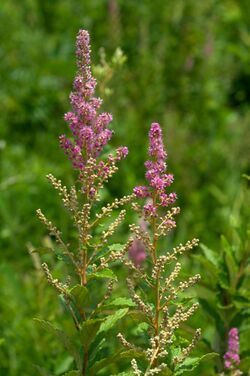Biology:Spiraea tomentosa
| Spiraea tomentosa | |
|---|---|

| |
| Scientific classification | |
| Kingdom: | Plantae |
| Clade: | Tracheophytes |
| Clade: | Angiosperms |
| Clade: | Eudicots |
| Clade: | Rosids |
| Order: | Rosales |
| Family: | Rosaceae |
| Genus: | Spiraea |
| Species: | S. tomentosa
|
| Binomial name | |
| Spiraea tomentosa | |
| Synonyms[1] | |
|
List
| |
Spiraea tomentosa, commonly known as steeplebush, meadowsweet, or hardhack, or eastern hardhack, is a flowering plant native to the eastern United States and Canada.[2][3]
Description
Spiraea tomentosa grows to up to four feet high and prefers moist to wet soil and full sun. It blooms in summer. Each tiny, pink flower is about 1/16 of an inch wide and arranged in narrow, pyramid-shaped flowerheads that grow up to eight inches long. The flowers are followed by small, dry, brown fruit. The specific epithet tomentosa refers to the undersides of the leaves and the stems, which are covered in a dense white-woolly tomentum.[3] It has similar characteristics to Spiraea douglasii.
Ecology
The plant bug Plagiognathus fuscosus breeds on steeplebush. Many bees visit the flowers: Apis mellifera (non-native), Bombus griseocollis, Bombus impatiens, Lasioglossum atwoodi, Lasioglossum hitchensi, and Hylaeus mesillae.[3]
Uses
Steeplebush is noted for its astringent properties, which cause it to be used medicinally.
The hardiness zone for this plant is listed as zones 4 to 8.
References
- ↑ "The Plant List: A Working List of All Plant Species". http://www.theplantlist.org/tpl1.1/record/rjp-977. Retrieved June 3, 2014.
- ↑ {{citation | mode = cs1 | title = Spiraea tomentosa | work = Germplasm Resources Information Network (GRIN) | url = | publisher = [[Organization:Agricultural Research ServAgricultural Research Service (ARS), United States Department of Agriculture (USDA) | access-date = 3 June 2014 }}
- ↑ 3.0 3.1 3.2 Wilhelm, Gerould; Rericha, Laura (2017). Flora of the Chicago Region: A Floristic and Ecological Synthesis. Indiana Academy of Sciences.
- Blanchan, Neltje (2005). Wild Flowers Worth Knowing. Project Gutenberg Literary Archive Foundation.
- Leopold, Donald J. (2005). Native Plants of the Northeast. Timber Press.
- Lawrence Newcomb (1977). Newcomb's Wildflower Guide. Little, Brown.
 Rines, George Edwin, ed (1920). "Hardhack". Encyclopedia Americana.
Rines, George Edwin, ed (1920). "Hardhack". Encyclopedia Americana.
Wikidata ☰ Q159771 entry
 |

